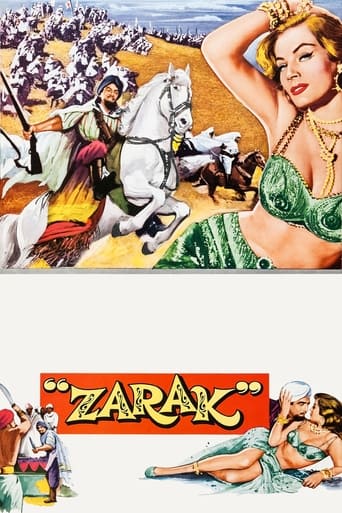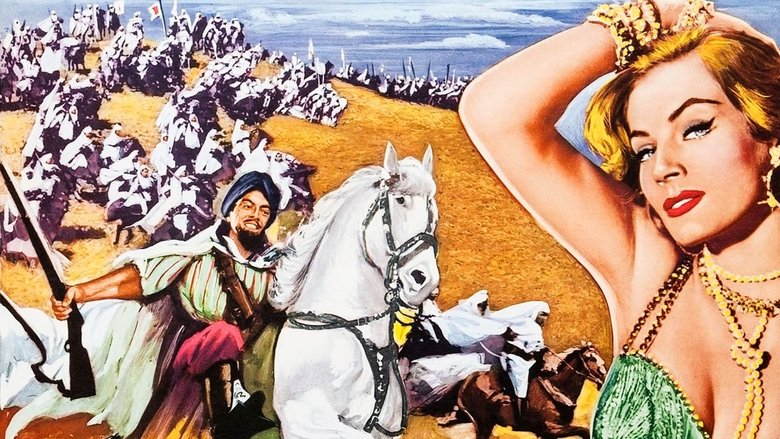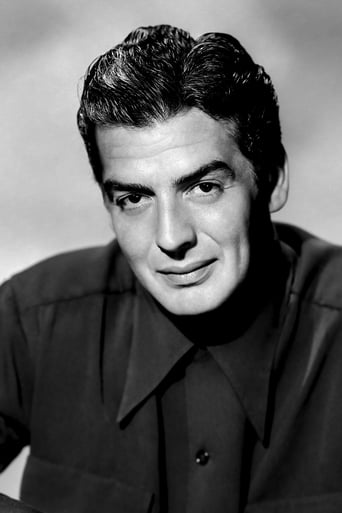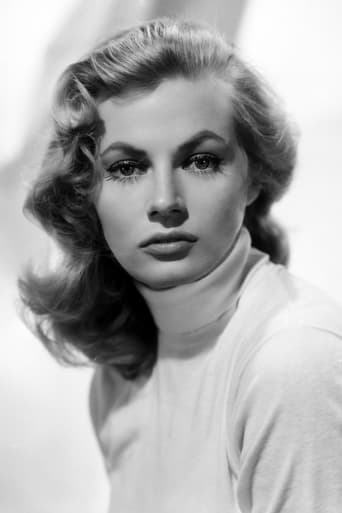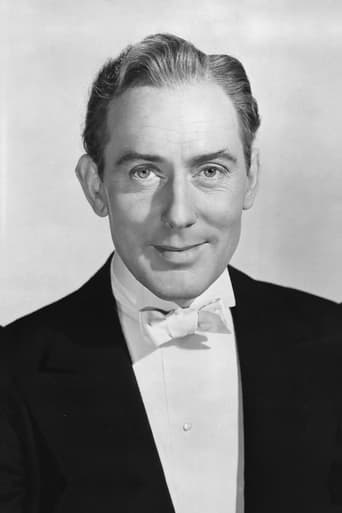Zarak (1956)
A notorious bandit develops a grudging respect for the English military man assigned to capture him.
Watch Trailer
Cast


Reviews
"Zarak" gets off to a roaring start - with us entering the Arabian village where Anita Ekberg's character lives with her old husband, being acquainted with her lusty relationship with his son (Victor Mature) and the father catching them in the act and sentencing them both to death - all within the first ten minutes of the film!!!! After that, it sort of delves into non-stop rebel war fighting scenes, which aren't that engrossing or all that well filmed - only momentarily catching up with Ekberg and her turgid relationship with Mature here and there. There are some very "American" touches of humour which clearly separate this US sword and sandal flick from the much more common Italian ones. But Anita Ekberg's scantily-clad dances, and sizzling seduction scenes are reason enough to seek out this title and sit through the yawn- inducing battle scenes which make up most of the movie.
Having adopted the name of Patrick McGoohan's character as my web ID, I'd almost avoided obtaining a copy of this movie, on the grounds that if it was truly awful and McGoohan's part poor, then I would feel a bit of a fool (Quiet at the back!). Thankfully I can be proud to perpetuate the name: Moor Larkin! Some while ago I bought a copy of 'Zarak Khan', by AJ Bevan. It is possibly one of the strangest books I've ever read. Zarak is a man, born in the most savage of societies. The savagery isn't primitivism, but stems from the strange morality that is deemed to have developed on the 'North West Frontier' of the Indian sub-continent. The book was fore-worded by General Slim, so was no morbid piece of sensationalism. Zarak betrays and is betrayed by not almost, but every, single other character, in the story. Written in 1949, it evidently had some popularity. Read in 2007, I can only attribute that popularity to the recognition of the nihilistic randomness that had so recently afflicted the people of Britain during WWII. The book appears to make no sense from the viewpoint of late 20th Century Western social conscience. Set as it is, essentially in Afghanistan, there is a resonance again however in the 21st Century, as the randomness of reborn violence once again seems inescapable.So much for the background. What of the film? The production team that would so soon be responsible for the James Bond Franchise set about the job of making Zarak a 'Cinemascope Spectacular'. Indian subjects of the Raj are the bulk of the Redcoats forming rife-volleying ranks, reminiscent of the African-based 'Zulu', but in Zarak they form triple, rather than double ranks: one lying, one kneeling, one standing. Tribal horsemen crash to the ground in a hail of Lee-Enfield bullets. Michael Wilding is a political officer, trying to persuade the locals of the benefits of British rule. Most of them seem convinced. Moor Larkin, played by Patrick McGoohan has fewer illusions. "Burn their villages and fine their men" he advises Wilding's Major Ingram. Death and money are all the locals respond to, so far as Moor Larkin is concerned.Zarak, played by Victor Mature, seems to be proof that Larkin knows what he is talking about. Zarak doesn't dislike anyone. He doesn't care about anyone. That is the point! He has no feelings either way. Zarak is Zarak. That is enough. If Zarak needs to love, he loves. If Zarak needs to eat, he eats. If Zarak needs money, he takes it from whoever has it. If Zarak needs to kill, he kills. Zarak doesn't do any of this for a reason. He seeks no power. A natural tribal leader, with more ferocity than any of his peers, he has no wish to lead. He uses followers to achieve his goals and then moves on.The film follows the battles, both military and those of the will, between Zarak and the British authorities. McGoohans' Larkin leads the forces as he attempts to preserve the life of the wishful-thinking Political officer, and achieve the capture of the outlaw, Zarak.Zarak is given a lover in the film. The introduction of Anita Ekberg was possibly the box-office life of the movie, but it's artistic death. Eunice Gayson pops in as the love interest for Major Ingram, the political officer. Her role is quite useful and makes a lot more sense than Ms. Ekberg; not that that was Ms. Ekberg's fault: if the producers dress her in wispy silk and make her gyrate at key moments of the movie, she can hardly be taken very seriously by anyone, I suppose. In a similar way this difficult story becomes enmeshed in military spectacle. If you just watch the film, you'll enjoy parts of it, but be confused by the whole. If you read the book and then watch the film, you can read between the frames and notice that Victor Mature actually does quite a good job, as does Patrick Mcgoohan. I suspect that they might both have been greatly disappointed when they saw the finished movie. Victor Mature probably laughed and chalked it up as another example of the mad movie-world he was so familiar with. Patrick McGoohan possibly took things a lot more seriously and was so ticked off with the directors/producers that he refused to get involved with them again, when they came up with some secret agent nonsense in 1960. No, he famously said. Doctor No, they said.At the end of the movie, Zarak has given his life for Ingram. Moor Larkin explains that "Zarak hated the world. He gave his life, merely to show his contempt for that world and everyone in it". Ingram mumbles something about "Greater love hath no man, than he gives his life for an enemy". Moor Larkin probably got closest to the truth.
In 1956 I was a twelve year old girl, going to the Saturday Matinée with my friends. The things I remember best about Zarak were the marvelous colors of the costumes, the romantic plot line and the desert fighting. It was both a Swash and a Buckle, and made even more exciting by its exotic location. Victor Mature was a bit long in the tooth, and probably could have played the father instead of the son, but he was still in good enough shape for my twelve year old heart to side with the errant lovers. Anita Ekburg didn't actually act much, but she was spectacular---in living color and almost in the costumes. In comparison to Victor Matures' be-robed macho, Michael Wilding seemed a bit of a stuffed shirt, leading most twelve year old girls to decide that Arabs were much sexier than Englishmen!
In "Zarak", Victor Mature didn't take his own acting ability too seriously... but he had a special sense of humor and the art to play the mighty outlaw of the territory with great bravery and courage...Zarak Khan is in love with Salma... Salma is one of the wives of his hateful and offensive father Hajji Khan (Frederick Valk). Salma is the statuesque and voluptuous blonde Anita Ekberg, who remains the impossible love of the mighty rebel...Anita Ekberg burns up the screen with her sexy figure... She looks so radiant and beautiful in her oriental gown, it really flatters her figure... Anita, as always, is tasty and juicy, but acting is not something that she excels in... Her zest is evident in her romantic scenes with Mature, but she stands exposed in places that require serious emoting... The one dimensional portrayal of all the characters is something common to the genre... Michael Wilding is not bad as the British political officer in pursuit of Zarak...Shot in Morocco, and photographed in CinemaScope and Technicolor, "Zarak" is somewhat an entertaining adventure...

